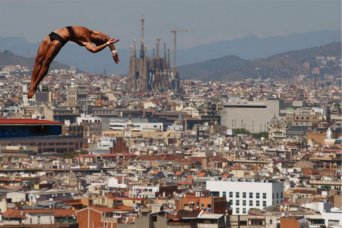- About
- Topics
- Picks
- Audio
- Story
- In-Depth
- Opinion
- News
- Donate
- Signup for our newsletterOur Editors' Best Picks.Send
Read, Debate: Engage.
Rarely have the Olympic Games transformed a city to such a great extent. Barcelona, which this year marks its 25th anniversary of hosting the sporting event, has reasons to celebrate its development, but could also become a victim of its own success. After the 1992 Olympics, the new Barcelona became cosmopolitan, innovative and creative, which led to a huge rise in tourism. In little more than two decades, the number of annual visitors to the capital of Catalonia rose from 1.7 million to a figure close to 9 million.
As in so many other cities, tourism in Barcelona has its bright and dark sides. It generates 15% of the city's GDP, employs thousands of people and provides extra income to those who have more than one bedroom in their house. But when numbers become excessive, problems inevitably arise. Recent studies show that tourism is today considered by Barcelona’s inhabitants its most serious problem. The speculative pressure is leading to illegal tourist apartments and is trapped in a real estate bubble that prices out residents and small businesses from the city centre.
It’s certainly not a phenomenon unique to Barcelona. But what´s intriguing about the Catalan capital is that its mayor was a former housing activist, who has demanded the right to live in the city as a priority. After several years as a spokesperson for the Platform for People Affected by Mortgages (an association that defends people at risk of eviction due to unpaid mortgage loans after Spain´s property market collapse in 2008), Ada Colau became Barcelona’s mayor in 2015.
Since then, she has quadrupled investment in housing policies, begun regulating construction of new hotels whilst limiting the allocation of short-term renting licenses.
Most strikingly is Colau´s battle against Airbnb, the online platform that triumphs around the world. Having become the first city in the world to fine the multinational (600,000 euros), Barcelona has launched further measures. Property inspectors have already identified 2000 illegal apartments that the company was forced to remove from their site.
Critics claim such measures are slow to show results, but Barcelona under Colau´s leadership is moving in the right direction and joining other cities such as Berlin or Amsterdam, in protecting local residents from the aggression of property speculators. Residents and the local community are the soul of a city and once forced out the city loses its identity. Therefore, guaranteeing the right to good-quality, affordable housing in their own city should be, as in Barcelona, the priority of any mayor.
